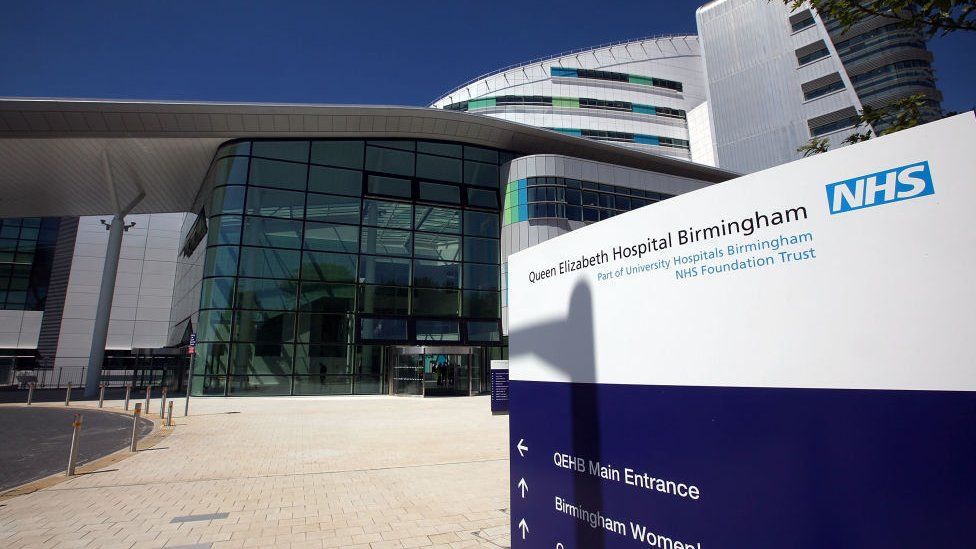ARTICLE AD BOX
 Image source, Getty Images
Image source, Getty Images
University Hospitals Birmingham is one of the largest trusts of its kind in England, employing more than 22,000 staff
By Susie Rack, Charlotte Rowles, Emily O'Sullivan & Michele Paduano
BBC News
More than half of staff at a hospital trust that has been under fire for its "toxic culture" have said they felt bullied or harassed.
The findings come from an independent review commissioned by University Hospitals Birmingham (UHB) NHS Trust.
It has been at the centre of NHS scrutiny after a culture of fear was uncovered in a BBC Newsnight investigation.
UHB has apologised for "unacceptable behaviours".
It added it was committed to changing the working environment.
The trust is one of the largest of its kind in England, responsible for the Queen Elizabeth (QE), Heartlands, Good Hope and Solihull hospitals, as well as community services.
Of 2,884 respondents to a staff survey, 53% said they had felt bullied or harassed at work, while only 16% believed their concerns would be taken up by their employer.
Many said they were fearful to complain "as they believed it could worsen the situation," the review team found.
Prof Mike Bewick said in June that the trust had a "mountain to climb"
As many as 30% said they did not always feel safe at work.
The details make stark reading, with most staff blaming their immediate line managers or colleagues for the bullying.
UHB's Independent Organisational Culture report follows another review by Prof Mike Bewick, prompted after whistleblowers told the BBC they had been punished for raising safety concerns.
One insider had previously described the trust in an interview as "a bit like the mafia".
'Sexual safety'
In Prof Bewick's two reports, published earlier this year, he wrote of a "historical coercive bullying culture where fear and threats were used as a management tool".
The latest of those reports, however, identified that improvements had been made.
UHB's survey, published on Wednesday, suggests the trust's problems remain widespread.
The second Bewick report, published in June, highlighted for the first time the issue of sexual harassment and the latest survey backs that up, with the review team saying that not enough was being done to "ensure the sexual safety of staff".
Image source, Family
Image caption,Junior doctor Vaish Kumar died in June 2022 and left a suicide note blaming her death on her experiences of working at the QE Hospital
Reviewers analysed documents and spoke to about 4,000 staff members in various departments over four months from April, including non-medical, board and senior leader team members.
Their report highlighted how unacceptable behaviours and working practices had developed, leading to staff feeling isolated, discriminated against, unsafe and undervalued.
It also set out key recommendations, including greater transparency by managers, a shift to valuing staff and measures to ensure a safe working environment.
Analysis by David Grossman and Sean Clare, BBC Newsnight
In one sense we haven't really learned all that much from this 54-page report that we didn't already know.
Anyone who's been following Newsnight's year-long investigation into what we were told was a "toxic" and "mafia-like" working environment at one of England's biggest and worst performing trusts would have been familiar with its findings.
Staff who felt bullied into silence, who feared their careers would be harmed if they spoke up and a management seemingly more concerned with reputational damage than patient safety.
But what this review does is provide official confirmation and, vitally for the patients and staff at UHB, a roadmap towards a more healthy, inclusive and safer culture.
Although several senior managers who presided over the trust in the past have since departed, the current CEO Jonathan Brotherton is not exactly a new broom. He has been at UHB for nearly a decade and was Chief Operating Officer from 2014 until his promotion earlier this year.
Many staff have told us they are going to need convincing that the leadership style of UHB has really and permanently changed.
'Difficult reading'
In response, UHB said it fully accepted the report's core recommendations.
"We are very sorry for the unacceptable behaviours and working practices that the culture review highlights and welcome the recommendations, which we fully commit to implementing," Jonathan Brotherton, UHB chief executive, said.
"Whist the review makes very difficult reading, it resonates with what we have heard directly from staff," he added.
Mr Brotherton said the trust had already begun to make changes to its infrastructure and leadership and would do everything possible to become "the best possible place to work".
Have you been affected by the issues raised in this story? You can get in touch by emailing haveyoursay@bbc.co.uk.
Please include a contact number if you are willing to speak to a BBC journalist. You can also get in touch in the following ways:
If you are reading this page and can't see the form you will need to visit the mobile version of the BBC website to submit your question or comment or you can email us at HaveYourSay@bbc.co.uk. Please include your name, age and location with any submission.
Follow BBC West Midlands on Facebook, Twitter and Instagram. Send your story ideas to: newsonline.westmidlands@bbc.co.uk
Related Internet Links
The BBC is not responsible for the content of external sites.

 1 year ago
49
1 year ago
49








 English (US) ·
English (US) ·